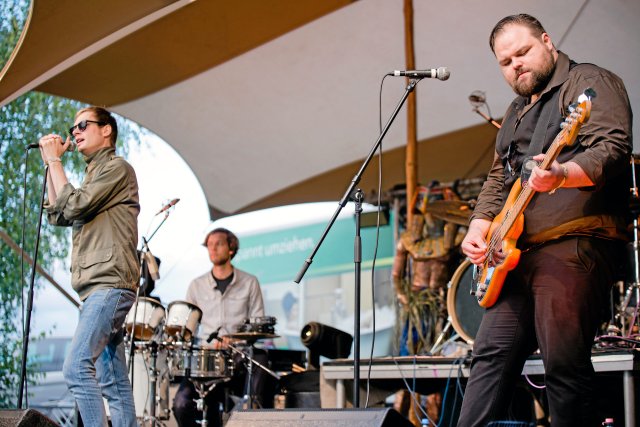Almost a hit band ten years ago: Messer
Photo: wikimedia
It is well known that the post-punk formation Messer values vague concepts that transcend space and time. She once called her debut, which was released twelve years ago, “In Vertigo.” In the years that followed, songs like “Staub”, “Tiefenrausch” and “Die Hölle” followed. The band around singer, songwriter and writer Hendrik Otremba recently released their new album “Kratermusik”. A phonetically edgy term that has far-reaching associations.
It may surprise some people to read about a new Messer album, as things have become quite quiet around the band in recent years. It wasn’t always like this: Together with the band Die Nerve, which was still based in Stuttgart at the time, they were the media figurehead of the post-punk revival in Germany in the early 2010s. With their second album “Die Unsichtbaren” they were on the verge of a small commercial breakthrough in 2013. Her hit “Neonlicht” made the rounds at the time and received almost 500,000 clicks on YouTube and Spotify combined in the following years.
Offers from record companies and media attention followed. But Messer wasn’t aiming for a career, but for artistic content. The bulky “Jalousie” follows in 2016. In the meantime, the band was at risk due to internal conflicts and disputes over direction. But the band consolidated and released the wavy, funky “No Future Days” in 2020, whose apocalyptic appeal anticipated the pandemic that began shortly afterwards.
The band is now continuing the path they took back then four years later on “Kratermusik”. The opener “Finding Peace” is a textbook Messer piece. “Finding peace, but how/ in a world/ without philosophy?” sings Otremba right at the beginning with his bright, inimitable vocals, underlining that questions can sometimes also imply accusations, even though the band refrains from making judgments.
With its mid-tempo beats and distorted guitars, the piece draws a line back to Messer’s early phase, before the funky and dubby-groovy thread of the previous work returns with the two following tracks “Schweinelobby (Der Defätist)” and “Der Atem”. is recorded. The following “Oswalth (1 2 3 4)”, on the other hand, comes with an almost hard rock-stomping riff and, with its catchy refrain (“Dance 1 2 3 4”), engraves itself in the cortex after the first listen.
The band cleverly varies tempos and dynamics over the course of the album. Energetic, punky tracks like “Eaten Alive” or “Spiegel” alternate with slower pieces like “Candle Smokers Last Night” or “At the End of a Great Confusion”. In this way, knives constantly demand the listener’s full attention. Nevertheless, you sometimes miss the recognition effects that the band produced en masse on their first three albums: apart from “Oswalth (1 2 3 4)”, only a few pieces remain in your ear even after taking off the headphones. But that’s not dramatic, because you can put it back on at any time.
Fairs: »Crater Music« (Trocadero/Indigo)
#ndstays – Get active and order a promotional package
Regardless of whether it is pubs, cafés, festivals or other meeting places – we want to become more visible and reach everyone who values independent journalism with an attitude. We have put together a campaign package with stickers, flyers, posters and buttons that you can use to get active and support your newspaper.
To the promotional package
